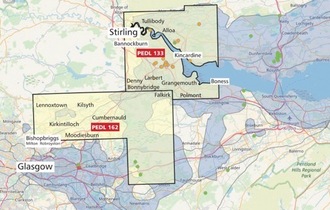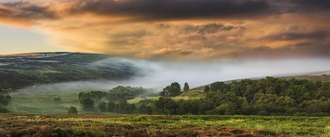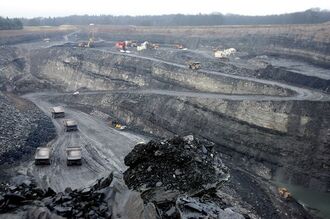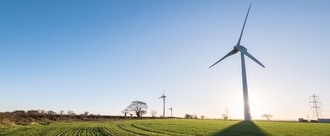-
Bring back the 29 busI myself am disabled and I now have to walk 20 minutes to the new bus stop, then walk 20 minutes to work. This is without standing around waiting for buses. If I choose to catch the new bus - 27 I will have to wait around for another bus to take me to the city. Also a lot of elderly people live on my housing estate and the change will make it harder for them to go to Harbourne as it does not go down the high street and also when they want to go to birmingham they will have to change buses and wait around for another one, this will be especially hard for them and myself in the winter months.22 of 100 SignaturesCreated by Dee Wakeman
-
Remove the licence to frackThe UK government sold two licences to frack in Scotland (Petroleum Exploration and Development Licenes - PEDLs). Now the Scottish government has been handed control of licensing and this gives them the chance to end the threat to the health of communities across the Central Belt once and for all PEDL 162 comes up for renewal on June 30th - we say, don't renew it. PEDL 133 has some years to go - we say, revoke it. And state that no further licenses will be sold. INEOS, who own both licences, recently went to court to say the Scottish government doesn't have the power to ban fracking. But if Holyrood has the power to licence, they also have the power NOT to licence. Support our petition and also contact your MSP and ask them to support us when the question comes up in the Scottish parliament.2,462 of 3,000 SignaturesCreated by Penny cole
-
Don't fast-track frackingFrom The Yorkshire Moors, to Sherwood Forest, to the Fylde Coast, our countryside - and our democracy - is at risk. The government has announced plans to streamline the planning process for fracking. If this goes ahead, it will be as easy to drill an exploration fracking well as it is to build a conservatory or erect a fence. These plans are deeply undemocratic - they twist planning laws to give the government and fracking companies the power to override the will of local people - who have fought relentlessly to halt fracking at every turn. These proposals could see scores of new drilling sites appear over the next couple of years in the English countryside – with the risk of untold environmental, landscape and climate impact. This is the government taking desperate measures to make fracking happen and it’s up to us to stop the proposals before it’s too late.201,716 of 300,000 SignaturesCreated by Sam Keyte
-
Help Briton to become GREEN ON ITS ENERGYTo make the UK a better and healthier place to live,and independent of other countries for our energy .8 of 100 SignaturesCreated by Raymond Spencer
-
The Daily Mile: Don’t accept funding from fracking company INEOSRunning a Daily Mile may be good for children’s health, but scientific studies suggest fracking is quite the opposite. A recent comprehensive report stated that fracking threatens the health of local residents "1 Growing evidence shows that [fracking] regulations are simply not capable of preventing harm" "2 Fracking and the disposal of fracking waste threaten drinking water" "3 Drilling and fracking contribute to toxic air pollution and smog (ground-level ozone) at levels known to have health impacts." http://concernedhealthny.org/compendium/ Not only that, fracking has been shown to have a detrimental effect on climate change, endangering children’s health and lives for years to come “World may hit 2 degrees of warming in 10-15 Years thanks to fracking”, Says Cornell Scientist https://www.desmogblog.com/2018/04/11/climate-change-two-degree-warming-fracking-natural-gas-rush-ingraffea For more information about INEOS Ineos 'misled' public over fracking in Sherwood Forest https://www.theguardian.com/business/2018/jan/05/ineos-fracking-robin-hood-sherwood-forest?CMP=share_btn_tw Desmog Uk background on INEOS http://www.desmog.co.uk/ineos192 of 200 SignaturesCreated by Oliver Swingler

-
No new opencast coal mines in Durham, UK.No new opencast coal mines have started in England since 2013. Since then the Government has said that it will phase-out coal by 2025. It's vital that we prevent a new mine starting which would cause local and international environmental destruction and which the local community have clearly rejected. Bradley is a greenfield site in County Durham between the villages of Dipton and Leadgate. The site supports a wealth of plants and animals, including Great Crested Newts, badgers, red kites. Banks Group plan to mine 550,000 tonnes of coal from the site, starting work this spring. The Bradley opencast mine is a case where the original decision to grant planning was grossly wrong and the development is likely to damage the wider public interest. Since the planning permission was granted in June 2015 there have been significant changes in national and international policy with regards to coal and climate change. 1) Coal use in the UK has dropped to 7% of the UK’s energy mix compared with 30% in 2014. 2) The government has said it will phase-out coal by 2025. 3) The UK and Canadian governments want to be world leaders with their Powering Past Coal Alliance. 4) The Paris Agreement requires that action is taken to prevent global temperatures from raising by 2 degrees and pursue efforts to keep them from a 1.5 degree raise. Thomas Davison, 28-year-old a resident living 300 metres away from the proposed opencast site said; “Banks' desire to extract 550,000 tonnes of coal is driven by nothing more than profit and not at all by a genuine need for energy. We have moved onto other forms of cleaner energy for the good of our global climate. So why is it worth harming the local wildlife and the local economy for one last money grab?”90,838 of 100,000 SignaturesCreated by Coal Action Network

-
NO WASTE INCINERATOR FOR CAMBRIDGE : PROTECT OUR AIR QUALITY AND HEALTHIf everyone who saw this, signed and shared it would achieve its objective within the hour! NO WASTE INCINERATOR IN CAMBRIDGE: PROTECT OUR AIR QUALITY AND PUBLIC HEALTH Unborn babies, infants and children are most at risk from incinerator emissions research has proven. Waste incinerators are associated with direct causal links to all-cause mortality, cardiovascular mortality and mortality from lung cancer, higher rates of adult and childhood cancer, birth defects, increased respiratory hospital admissions, a range of emotional and behavioural problems in children, learning difficulties, and delinquency, cell level genetic changes which pose a risk to future generations , and in problems in adults including violence, dementia, depression and Parkinson’s disease, after adjustment for other factors. These findings come from a wide variety of peer reviewed research, meta-analysis and reports conducted by The World Health Organisation (WHO), British Heart Foundation, British Lung Foundation, Friends of the Earth, Greenpeace, Lancet Commission on Pollution and Health, The British Society for Ecological Medicine, DEFRA, Asthma UK, Client Earth. All conclude that incinerators should NOT be approved. This directly affects your health and that of your family and friends. Don’t say you weren’t warned! YOUR VOICE MATTERS and IT DOES COUNT. If approved against all advice from world leading environment, climate change and health advisory bodies, Cambridge air pollution WILL increase, forever, with significant and predictable life threatening and life changing health consequences for many, particularly affecting the most vulnerable youngest members of society. Amey Cespa proposes a £200M waste incinerator in Cambridge that will burn 250,000 tonnes commercial and household waste /yr, from 5 counties incl. Isle of Wight (selling surplus to China), fed at this rate minimum to justify investment. AC already provides facilities for waste recycling, composting, landfill and mechanical biological treatment. Yes, it proposes energy for 45,000 homes and 300 jobs during construction and operations but does that justify proven and predictable health effects above? Read them again – all-cause mortality, cancer, mental health, adverse effects in unborn babies, infants and children who by nature are in a biological window of vulnerability. AC submitted their application 20th Dec for a 21 day public consultation, just before the busiest holiday period of the year. They have followed min. statutory requirements to notify the public. For such a major infrastructure application that presents enormous city wide public health and environmental impact, providing 2 short notice site public information meetings (advertised briefly in neighbouring villages) and 2 recent short notice neighbouring parish council meetings, it does appear like AC would rather prefer the application flew very much under the public radar. The UK and Cambridge has a problem with waste management but if incineration is the answer, somebody asked the wrong question. Waste incineration in Cambridge will produce an unprecedented health risk for people living in and around the city, air pollution WILL increase and forever with significant and predictable health consequences. AC cannot guarantee that waste incineration is safe for public health. Toxin emissions and particulate pollution have to go somewhere. EC reports advise reducing NOT increasing air pollution to reduce and prevent land, coast and sea ecosystem damage due to acidification, thus also protecting water, food chains and organic farmers. There is already local evidence of significant health impacts from the AC Cambridge waste management site. 2016- AC was fined by Cambridge magistrates £50,000 for causing sickness and adverse effects on human health, and prior to these incidents, received 3 enforcement notices 2015 by the Environment Agency. ‘AC fined £50,000’ by F Snoad, Cambridge Evening News, Sep 2016. The environment agency continues to receive regular calls reporting problems with air quality relating to this site. Local newspapers have reported ongoing problems with local residents and workers complaining of feeling sick, gagging, wheezing, sore eyes and throats, constant unpleasant smells causing them to have to keep windows shut. ‘The waste park is poisoning us: Cambridgeshire villagers concern at Amey recycling centre’ by Samar Maguire, Cambridge Evening News, Sep 2017. It is enshrined in EC and UK legislation that reducing emissions produces true health benefits, prevents unnecessary burden on healthcare, and protects against the impacts of acid air and water on local and wide ranging ecosystems including land, coast and sea. Costs of incineration, together with research investigating nonstandard emissions from incinerators, has demonstrated that the hazards of incineration are greater than previously realised including that relating to fine and ultrafine particulates. Operating waste incinerators in urban areas results in dangerous health and environmental consequences from both construction and operation. The accumulated evidence on the health risks of incinerators is simply too strong to ignore and their use in Cambridge cannot be justified now that better, cheaper and far less hazardous methods of waste disposal have become available. The planned chimney stack height is out of keeping with surrounding local village architecture and the Fenland landscape: contravening NPPF guidelines. The proposed site is greenfield which will potentially be adjacent to major new residential areas. Waste minimisation, recycling and composting through innovation and behavioural change are the answer not incineration and certainly not in urban areas. Residents of Cambridge have human right to clean air and their health protected.2,520 of 3,000 SignaturesCreated by Jude Sutton
-
Bring back Onshore wind energyOnshore wind energy is our most abundant and cost effective form of renewable energy, and until it was banned by the previous government it was our most successful. It remains highly popular with opinions polls (including the government’s own) showing almost three quarters of the public support it - this support has been consistent for the last 20 years. With energy bills in Britain generally regarded as being too high and our government proposing a cap to address the issue - it makes no sense to pay considerably more than we need to for new forms of green energy. Fighting climate change with green energy is essential, we should not make it more expensive than it needs to be. A recent report from the ECIU (Energy and Climate Change Intelligence Unit) estimates that we will pay over £1 billion more on our energy bills - over just the next four years - if we continue to exclude onshore wind energy. Onshore wind is an economic and environmental opportunity for Britain.1,595 of 2,000 SignaturesCreated by Dale Vince

-
Support Kirby Misperton Protection CampThe Kirby Misperton Protection Camp (KMPC) has been invaluable in our community’s struggle against fracking, now we stand to protect it! The camp was set up last December after the community lost a high court appeal to prevent Third Energy from fracking on the edge of our village. The camp acts as a community hub, its a place where we can go and seek support, information and share ideas. It also hosts events such as family fun days, solidarity weekends, know your rights workshops, legal observer training and a retreat. The camp is also home to some of the newer members of our community and offers a place to stay for campaigners with bigger distances to travel. The fracking of the KM8 well is putting our villages directly in harms way, but we also recognise that we are on the frontline of England’s struggle against the fracking industry. Fracking in Kirby Misperton is a local issue of national importance. All protest involves a level of disruption, but neither we nor the camp support any kind of violent or abusive behavior. As local residents we are grateful to friends who have made the choice to live so sacrificially to join our struggle. As such we welcome KMPC and the support from protectors around the country.2,282 of 3,000 SignaturesCreated by Graham Cray
-
Save The current route of our Number 32/33 Fintry Bus ServiceXplore are proposing two alternative routes to the 32/33 bus which would cut out Forfar Road. Their consultation highlights that the route could also stay as it is. You can see the proposed two route changes at this link http://nxbus.co.uk/files/NXDundee/misc/FintryRouteReview-PublicConsultationDocument.pdf This re-routing would severely restrict people's ability for travel: • make it harder for people with disabilities and older people with mobility problems to catch a bus and get out of the house, potentially leading to loneliness and social isolation • safety concerns of having to work through a scheme to get to/and from the bus • get to and from work • visit friends and relatives • access education and training • access to hospitals, doctors, dentists and other medical services • access to leisure activities including town and countryside locations Fewer buses on the road will mean more traffic congestion and delays which affects all of us.174 of 200 SignaturesCreated by Michael Hughes
-
Install Electric Vehicle chargers in Glossop and High PeakThe High Peak area is almost completely devoid of electric vehicle charging infrastructure. Between Stalybridge and Sheffield there is a distance of over 30 miles without any publicly available chargers. Given the serious traffic congestion in the area you would expect the local authority to be doing all they can to promote alternative fuel sources to mitigate air pollution, noise and climate change. Electric vehicles will not solve congestion, but diesel and petrol engines are causing excessive and unnecessary harm as the government has recently indicated by targeting a ban on the sale of fossil fuel only cars by 2040. High Peak is currently not in a position to meet this target and risks lagging behind nearby areas. High Peak needs to take advantage of funding sources available for the cost of electric charging and show some leadership in the field - Greater Manchester has an extensive network of free to use charging points.137 of 200 SignaturesCreated by James Thorp
-
NYCC open enquiry into failure of Ings Primary School SkiptonThere are currently 7 primary schools Under the NYCC care in danger of closing. We have already lost 3. In an ideal world Ings would remain open, and the heart of the community however as this now seems futile I feel that there needs to be a full investigation into why we have got into this situation, and how we are going to prevent it happening again. I would also like it to be investigated why we are closing these schools yet allowing private developers to put in planning for two new schools in the area- both of which will be owned by an academy or free school, meaning they will no longer be under any of NYCC remit- a massive safeguarding issue248 of 300 SignaturesCreated by Claire Harvey
Hello! We use cookies to improve your experience by providing insights into how the site is being used. Find out more.












